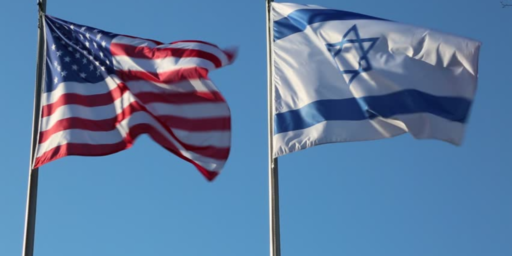IRAQ AND ISRAEL
Thomas Friedman beings his column today with a rather bizarre reference to The Shining that I’m afraid I don’t get:
Whenever I think of President Bush’s invasion of Iraq, the image that comes to mind is that famous scene in the movie “The Shining” where Jack Nicholson, playing a crazed author, tries to kill his wife, played by Shelley Duvall, who’s hiding in the bathroom. As Ms. Duvall cowers behind the locked bathroom door, Mr. Nicholson takes an ax, smashes it through the door, and with a look of cheery madness peers through the splintered wood and announces, “Heeeere’s Johnny.”
That’s the U.S. invasion of Iraq. In a region where the combination of oil wealth, culture and the cold war has ossified politics for so long, in a region that has been barricaded from history for so many years, in a region where the U.S. has always been a status quo power, never a revolutionary power — the U.S. just crashed right through the locked door: “Heeeere’s Dubya.”
I’m not sure what that means, exactly. Or even inexactly, for that matter. Friedman supported the war, as I recall, so I’m guessing it’s not a criticism. But what then?
He then turns around and makes an interesting point:
But here’s what’s surprising: So far, the biggest political fallout from the Iraq war has not been in the Arab world. It’s been in Israel. Say what?
Yes, by destroying Saddam’s regime and the real strategic threat posed to Israel by Iraq, the Bush team has taken away one of the strongest security arguments from Israeli hawks: that Israel needs to keep the West Bank, or at least troops on the Jordan River, as a buffer in case Iraq again tries to come through Jordan to strike Israel, as it has done before.
As long as Iraq loomed as a major threat, one could hear three arguments in Israel. One said no withdrawal from the West Bank and Jordan River was possible because Israel needed a security buffer. Another said withdrawal was essential to maintain Israel as a Jewish democracy. Because if Israel kept control of the occupied territories, there would soon be more Arabs than Jews living in the West Bank, Gaza and Israel. A third said that no withdrawal was tolerable because the Jewish state needed to control all the Jewish land, including the Biblical West Bank.
The Israeli right has tended to blend the security and the Jewish land arguments, while the Israeli left has focused on the need to maintain a Jewish majority so Israel doesn’t become an apartheid state. But with the Iraq threat now gone, the argument is increasingly between those on the left and center who want to get rid of the territories to preserve Israel as a whole Jewish state and those on the Israeli right who want to preserve Israel on the whole Jewish land.
***
Of course Israel is the first state in the region to experience real fallout from Iraq. The freer the society, the more it is capable of speedy reflection, self-criticism and self-correction.
The absence of democracy in the Arab world (coupled with the U.S. failure to stabilize Iraq) makes Arab states much more resistant to immediate political fallout. Their writers do not have enough freedom for meaningful self-criticism, and their lawmakers don’t have enough freedom for meaningful self-correction.
So, have we smashed down the Middle East door only to find that there is no one on the other side? No, if we produce a decent outcome in Iraq, it will become an inescapable reality and the whole Arab system will have to respond — but it will be slow.
We shall see, I guess. Pardon me if I don’t hold my breath, though.





